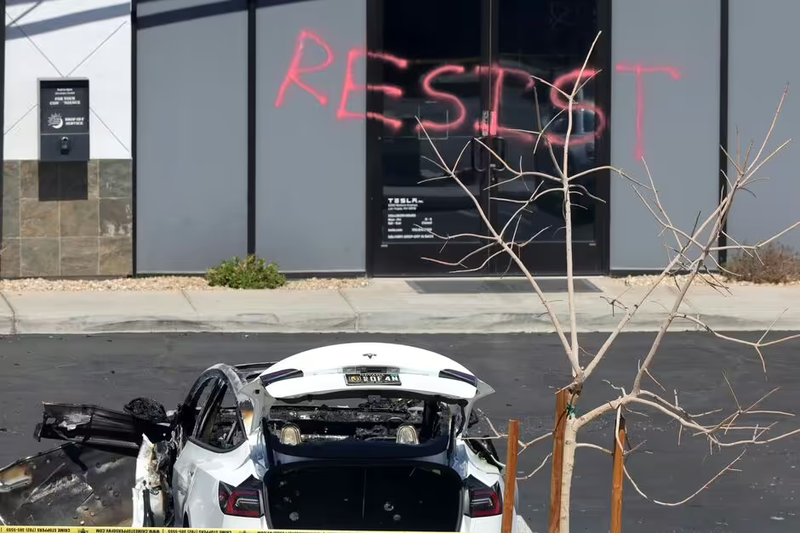The FBI has launched a new task force targeting what it calls “domestic terrorism” after a series of violent attacks against Tesla vehicles, dealerships, and charging stations across the U.S. The announcement comes after multiple high-profile incidents, including Molotov cocktails being thrown at Tesla properties and gunfire at showrooms.
The task force, working alongside the ATF, will investigate arson, vandalism, and threats tied to anti-Tesla sentiment — much of it linked to opposition to CEO Elon Musk’s role in the Trump administration’s Department of Government Efficiency (DOGE), which aims to dramatically reduce the size of the federal government.

“These are not protests — they are acts of terrorism,” said FBI Director Kash Patel. Attorney General Pam Bondi echoed the statement, warning that those targeting Tesla are escalating to dangerous criminal behavior.
Surveillance footage and police reports detail attacks in at least nine states, including Nevada, Oregon, South Carolina, and Massachusetts. The FBI says many incidents occurred overnight and were carried out by lone actors. Tesla-related properties have been defaced with political graffiti and firebombed, while employees and even protesters outside Tesla locations have faced threats.
But beneath the surface of this domestic conflict lies a deeper geopolitical concern. U.S. officials have warned that foreign influence — particularly from China — may be quietly fueling divisions online, amplifying anti-Musk sentiment and targeting American technological leadership. China has a clear interest in undermining Tesla, one of its fiercest EV competitors globally.
Beijing has a history of using cyber warfare, propaganda, and economic leverage to destabilize Western firms and governments. With Musk’s growing influence in both technology and politics, Tesla has become a symbolic and strategic target. U.S. intelligence agencies have already linked China to online campaigns attacking American innovation and fomenting unrest in domestic policy debates.
In addition, analysts have pointed out that attacks on Tesla, if amplified or coordinated, could damage U.S. public trust in electric vehicles, clean energy, and technological autonomy — all areas in which China is aggressively competing. Undermining Tesla doesn’t just impact a company; it threatens a major pillar of American innovation.
China’s investments in global media platforms and tech infrastructure allow it to spread misinformation at scale. Social media bots, fake accounts, and targeted disinformation campaigns have been traced back to Chinese-linked networks that deliberately stir division, create confusion, and erode trust in American institutions. In recent years, China’s digital influence operations have expanded far beyond its borders — reaching deep into U.S. political and social discourse.
Experts warn that this digital manipulation can indirectly embolden domestic extremists, create echo chambers of hate, and make acts of sabotage seem justified to vulnerable individuals. The Tesla incidents may be just one symptom of a broader strategy: weaken the U.S. from within by turning citizens against each other and against national industries.
The Justice Department urges the public to stay vigilant and report suspicious activity near Tesla locations. As the U.S. confronts threats at home, Americans must also remain alert to foreign adversaries exploiting internal conflict to weaken national unity and industrial strength.
National security isn't just about borders — it's also about protecting innovation, preserving trust, and preventing adversarial powers like China from dividing us from within. Awareness is defense. Unity is strength.